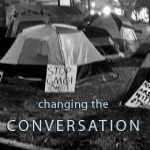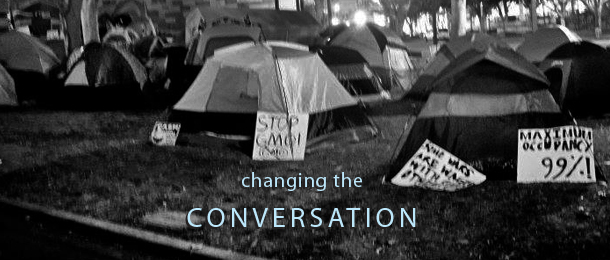 The corporate media and established political class complain that the Occupy Wall Street movement has no clear demands. In response, Dahlia Lithwick, in her brilliant editorial in Slate last month, “Occupy the No Spin Zone,” points out that the movement refuses to fashion its message for the political and economic elite, who daily demonstrate their refusal to hear anything that does not fit their formulation of reality.
The corporate media and established political class complain that the Occupy Wall Street movement has no clear demands. In response, Dahlia Lithwick, in her brilliant editorial in Slate last month, “Occupy the No Spin Zone,” points out that the movement refuses to fashion its message for the political and economic elite, who daily demonstrate their refusal to hear anything that does not fit their formulation of reality.Emphasizing that the message of the movement is clear to anyone who does not expend enormous mental energy trying not to hear it, she sums up one hope of the movement beautifully: “Maybe the days of explaining the patently obvious to the transparently compromised are behind us.”
This refusal to meet the establishment on its terms, to make demands that implicitly affirm the current system that has impoverished so many, constitutes more than stubborn protest; it arises out of a desire for a different kind of world.
The movement has focused not on demands, but on occupying space. By reclaiming and occupying physical space, we can clear the mental space we need to re-imagine the world and reform our own minds.
For generations, our minds have been formed and occupied by the values and ideology of a market-based economy and culture. To make this mental occupation possible, our communities also had to be geographically formed around market interests. The final outcome in the US is a society in which the commons are quickly being taken over –– occupied –– by the corporations, and much of daily life is dictated by commercial forces.
Globally, the past two decades have seen aggressive attempts by corporations to take over schools, libraries, parks, energy and water systems and anything else they think they can squeeze money out of to add to their already gargantuan wealth. Some of these attempts have been successful and have led to disastrous consequences, such as in Lima, Peru. There, the poor wound up having to pay private vendors $3 per one cubic foot of water, which was contaminated and which they had to carry, while the affluent paid 30 cents for clean tap water.
Other attempts at corporate takeover have failed, such as in Cochabamba, Bolivia, where the people organized mass demonstrations that drove Bechtel Co. out of the country.
Here at home, we have experienced similar disasters of privatization, such as the failed attempt to privatize the electricity market in California. The attempt failed, but not before corporations absconded with more than $40 billion of taxpayer money.
Despite all of these failures and disasters, privatization ideology continues to capture the minds of much of the political class, such as Obama’s Secretary of Education, Arne Duncan, who aims to transform the public school systems of the nation into profit-making ventures for corporate elites.
The Occupy movement has arisen as a counter-offensive to reclaim physical and mental space to retrain our minds and transform our society into one of cooperation rather than competition. That is why our encampments have formed egalitarian communities with general assemblies operated by consensus. In a culture accustomed to sound bites, fast food and all manner of instant gratification, this whole project appears too slow and unfocused; and to be honest, the movement has encountered many problems and is still shaky in terms of sustainability. But the Occupy movement has already changed the national conversation, previously dominated by a fake budget crisis, and it is the only movement to come along in many years that has attempted to strike at the heart of the beast in the hope of making another world possible.
I recently joined the new Occupy Pasadena branch of the movement. We have not yet started an encampment and do not know if we will, but we have initiated an outdoor general assembly and street actions that reclaim space for democracy and free speech.
Our Web site, http://www.occupypasadena.org, lists our meetings and actions.
I joined not out of a firm confidence that we will be successful in achieving any specific demands, but rather out of a firm conviction that the only way out of the political, economic and environmental crises of our times is to re-form ourselves and our society.
Bert Newton has lived in Pasadena for 20 years, attended Fuller Seminary, attends Pasadena Mennonite Church and participates in Occupy Pasadena.
Please note that this piece has been used with the authors written permission. It was first published in the Pasadena Weekly.

“Mental Occupation?” So, are you saying you have been brainwashed by the corporations and you are no longer free thinkers? They forced you to buy, buy, buy and move to a geographic location near all the shopping? You had absolutely no restraint and were forced into it? You have got to be kidding me. There are plenty of us out there who are not going to sip on that Kool-Aid. There are plenty of us who saved our pennies for a rainy day, didn’t buy a home we couldn’t afford, and are happily driving an older car and using phones and computers that are not the latest and greatest “must haves”. Nice try at adding an after the fact, fabricated explanation as to why OWS is so disjointed.
The media and political class are not the only ones complaining that OWS has no clear demands. I’m neither of those and I’m asking why they are not making definitive ultimatums also. I’ve read the signs. (Some deserve attention, some don’t.) But it’s like when you have way too many things on your “must do” list. There are so many that you can’t focus on tackling any of them. So there they sit – unattended, undone, incomplete. OWS did get a national conversation going. Now it needs to prioritize in order to get results.
Let me be clear in saying that I would like to see massive change in how corporations, lobbyists and Congress operate together. It’s sick. We need to stop them from being allowed to serve only their own best interests while ignoring the people. But I don’t see the OWS movement’s current actions and lack of a cohesive message making that happen. And I don’t believe concocting psychological afterthoughts is helping your cause.